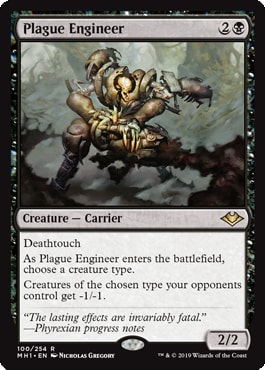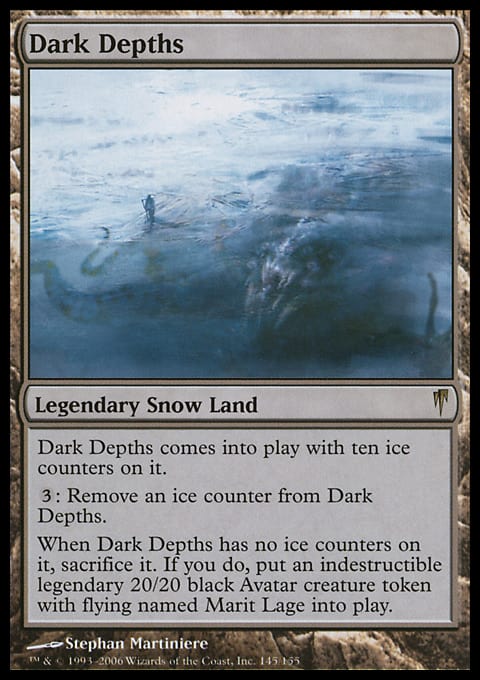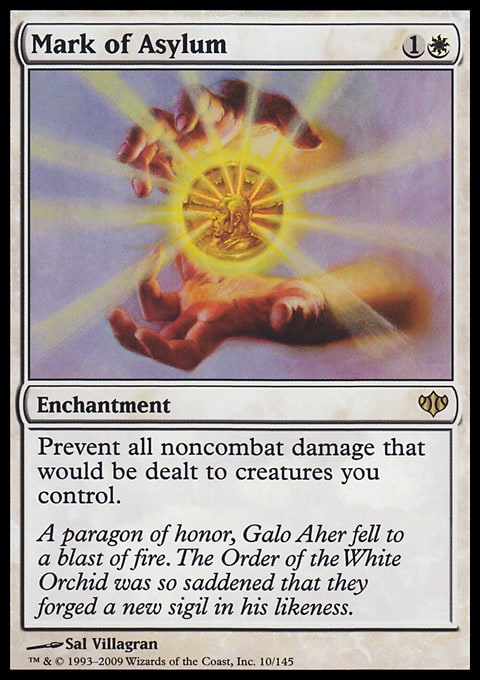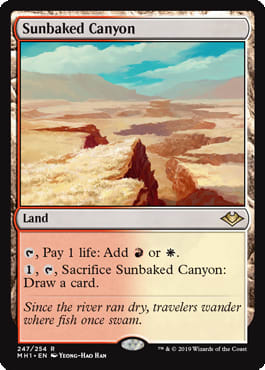The other night, I sent my Twitch audience with me over to watch my friend Jody Keith play Grixis Urza in Modern. At one point, laughing, he joked about his love of durdling control decks as he activated Urza, Lord High Artificer.
A few days later, I was in Detroit visiting my friend Jen, she was looking for a new deck to try in Modern, and I pointed her in the direction of the various Urza, Lord High Artificer decks, in large part because it seemed like they might be up her alley. The particular build she ended up on was a Sword of the Meek/Thopter Foundry build, and she played it for a bit on Magic Online before switching to another deck. Jen joked that her favorite modern deck, Turbo-Mill, had pretty much sucked before Hogaak, but was now unplayable.
One of the things I noticed as we played Magic Online side-by-side for a few hours is just how ubiquitous Modern Horizons was, in cards far beyond Hogaak, Arisen Necropolis. As I thought about the cards I was seeing, I asked her why she liked Turbo-Mill so much, and she said it was fun to keep people from making certain plays at all.
I couldn't help it. I started thinking about my favorite Constructed format, Legacy. Death and Taxes was a deck that was in large part all about not letting people make their plays. I hadn't played it in several months, and Modern Horizons wasn't out when I had played it, so I started thinking about what changes in the deck in a post-Modern Horizons world.
The Incidental Hate
First of all, one of the new cards on the block in Legacy is pretty wickedly powerful against Death and Taxes.
Wrenn and Six can wreak havoc on a great many creatures in Death and Taxes. The card is naturally powerful and playable all on its own, akin to a slightly cheaper Crucible of Worlds; it's +1 ability is even more powerful for Legacy than it is in Modern simply because of the great power of even something like a fetch-land, not to mention cards like Wasteland. The -1 is a wickedly powerful ability in a world where there are so many creatures that are meaningful with only a single toughness.
Frankly, the entire non-Death and Taxes world warps because of Wrenn and Six. Death and Taxes itself is especially hard hit by the card.
This card is so good that it could be being run in main decks - and sometimes it is - and Death and Taxes, while not strictly tribal, is tribal enough that Cavern of Souls is a rational card for the deck. Amusingly, it could also be an answer for a Death and Taxes deck's most dangerous enemy, True-Name Nemesis, in versions that would choose to splash Black, but that's another story...
It's very easy for a Plague Engineer to come down and wipe out more than one creature and still be around waving its deathtouch at any creature that is remaining. For a deck that is trying to create and establish a set of problems on the table for an opponent, Plague Engineer can typically represent not only a two-for-one, but a two-for-one that completely rips apart some of the best cards in the deck, might hold new cards that could help off of the table, and then trade with some other relevant card later on. All told, Death and Taxes, despite being a Prison deck that exists to hold an opponent off of their game plan, also does attempt to end games decisively, so Plague Engineer is a problem.
The New, Dark World
An increased focus on lands is more possible now; while the new "Canopy-lands" that mimic Horizon Canopy are common enough, it is Elvish Reclaimer that made a big splash, making land-oriented strategies obviously more powerful. Three of the Top 8 decks in the recent Magic Online Legacy Challenge made use of four Elvish Reclaimer, one a classic Golgari Depths build, another a Maverick/Depths hybrid, and the third a Hogaak-Depths Hybrid
Dark Depths decks are capable of an incredibly fast kill, but they also have a lot to reckon with from Death and Taxes, so this might be, overall, somewhat good news for D&T. From the perspective of the metagame, these decks are often quite good against traditional control decks like ![]()
![]() Miracles, so Death and Taxes is sitting a bit better from that perspective as well. On the negative side, however, Prismatic Vista is a strong weapon for the Back to Basics-loving decks out there, which can be an issue for Death and Taxes at times.
Miracles, so Death and Taxes is sitting a bit better from that perspective as well. On the negative side, however, Prismatic Vista is a strong weapon for the Back to Basics-loving decks out there, which can be an issue for Death and Taxes at times.
The Update
As I was thinking through the cards I wanted for my build in this current moment, one key question I had was how much I felt like the deck needed to build up its resilience to the pinging ability of Wrenn and Six. I had a few ideas of cards that were potentially interesting to me for the sideboard.
Each of these cards has decent reasons to be considered in a current Death and Taxes sideboard.
Force of Virtue completely shuts down a single Wrenn and Six activation as a means to kill your creatures, and is similar effective against a single Plague Engineer or Dread of Night (should you play against that relic). It also carries with it the added bonus of potentially helping to create a faster kill incidentally outside of game states that involve those two cards. The loss of a single card to cast it for free is still meaningful and the cost to pay mana for it is prohibitive, but this is certainly on my short list.
Mark of Asylum has long been a go-to card for my sideboards. Depending on how much a metagame makes use of damage to control creatures, this card can be incredibly powerful, especially when cards like Walking Ballista or Endbringer are in the mix in the current moment. Of course, usually, the damage-oriented cards you're worried about are usually Red, which is why keeping it simple with Absolute Law can be a much more reasonable choice, especially since you can also nearly turn off all Red creatures on top of stopping burn from killing your creatures.
There is certainly a way in which all of these activated abilities inspire me to want to go back to a choice I've sometimes skimped on in the past: a full set of Phyrexian Revoker. Phyrexian Revoker can easily be a card you can shave down to as few as two copies, especially with Recruiter of the Guard in the mix, but sometimes you just want to make sure that you have it on turn two. Sure, it can't turn off the abilities of lands, but for that, hopefully your Rishadan Port and Wasteland will do the work you need.
Two small shifts I've made to my version of the deck are simple nudges. Recruiter of the Guard makes playing a tutorable target more interesting, especially if it is an analog to another card. I'm still deciding if Giver of Runes protecting my creatures from, well, Eldrazi is worth it or not, compared to being able to protect itself from more common removal. Right now, I'm trying out a single copy, and might go back to four "mom", good 'ol Mother of Runes, but I want to keep experimenting. Sunbaked Canyon has replaced Horizon Canopy for me because Sunbaked Canyon could more likely be misinterpreted as a signal for a much different archetype as a first land than Horizon Canopy signals.
Here is my current build of Death and Taxes:
Death and Taxes | Legacy | Adrian Sullivan
- Creatures (25)
- 1 Giver of Runes
- 1 Mirran Crusader
- 1 Palace Jailer
- 1 Sanctum Prelate
- 2 Recruiter of the Guard
- 3 Mother of Runes
- 4 Flickerwisp
- 4 Stoneforge Mystic
- 4 Phyrexian Revoker
- 4 Thalia, Guardian of Thraben
- Instants (4)
- 4 Swords to Plowshares
- Artifacts (7)
- 1 Batterskull
- 1 Sword of Fire and Ice
- 1 Umezawa's Jitte
- 4 Aether Vial
- Lands (24)
- 11 Plains
- 1 Mishra's Factory
- 1 Sunbaked Canyon
- 4 Rishadan Port
- 4 Wasteland
- 3 Karakas
With as varied a metagame as we see in Legacy, I'm often siding in Council's Judgment against basically everyone. A lot of versions of this deck I see only running two copies of the card, and I'm happy to have three, if only because I expect that the antagonism of an opposing deck to ramp up in a second game. Answering anything (well, except lands) is a potent ability that I'm willing to give up slots for instead of running a card like Path to Exile or some additional disenchant variant.
Pithing Needle in the board is a recognition of the deck's need to take care of Planeswalkers, sometimes incredibly quickly, while also being a good weapon against the land-based Depths strategies. There is an argument that this could be a fourth Council's Judgment, but I feel more comfortable with the ability to play such a quick card in so many matchups, especially if hoping to preemptively stop a Wrenn and Six.
My deck is currently fairly weak to Storm; if you wanted to increase the resistance to that deck, you could up copies of cards like Chalice of the Void or Ethersworn Canonist, but I'm absolutely willing to just keep the few cards I'm running for that fight: the Chalice, the second Sanctum Prelate, and the Canonist. In my opinion, this archetype is naturally weak to Storm decks and their cousins, so I'd rather just have access to a more varied sideboard with cards that might have applications elsewhere rather than try to turn around a matchup that is such a natural struggle.
I keep a "Death and Taxes Box" so that I can always be ready to shift around my Death and Taxes deck to whatever I think the current metagame looks like. It's cool to have put a few Modern Horizons cards into it. I can't wait to see if I'll add anything to it from Throne of Eldraine!
Let's get taxin', folks.
Follow me on Twitter! @AdrianLSullivan
Follow me and subscribe on Twitch! /AdrianLSullivan
































